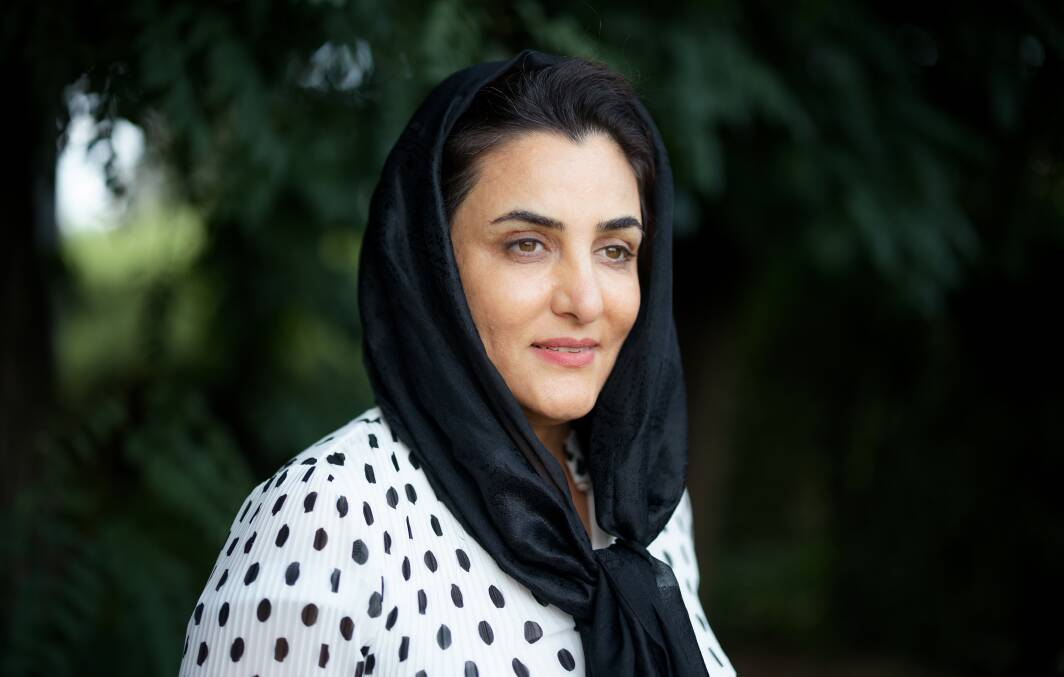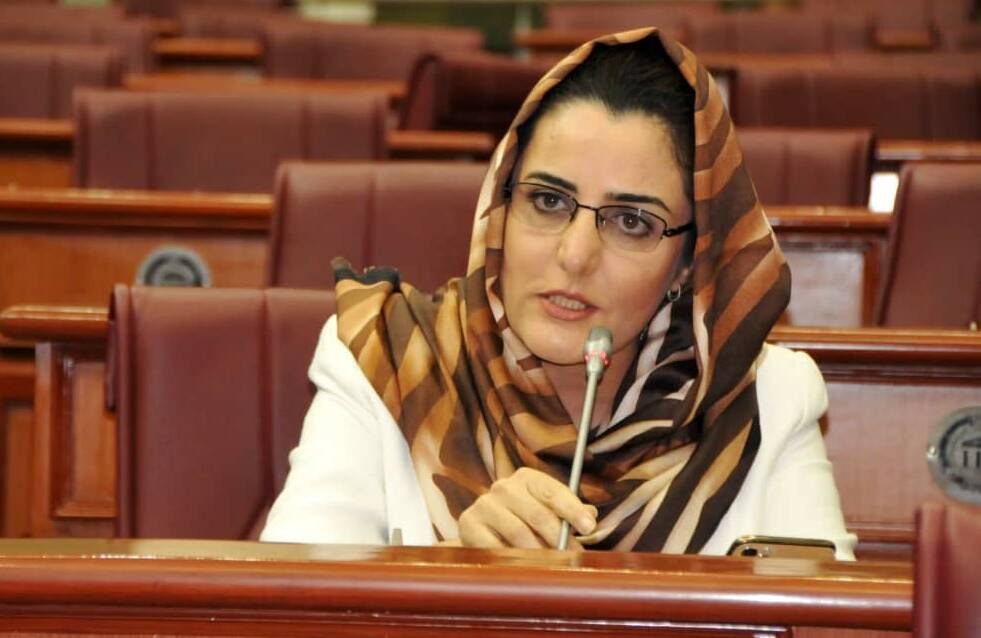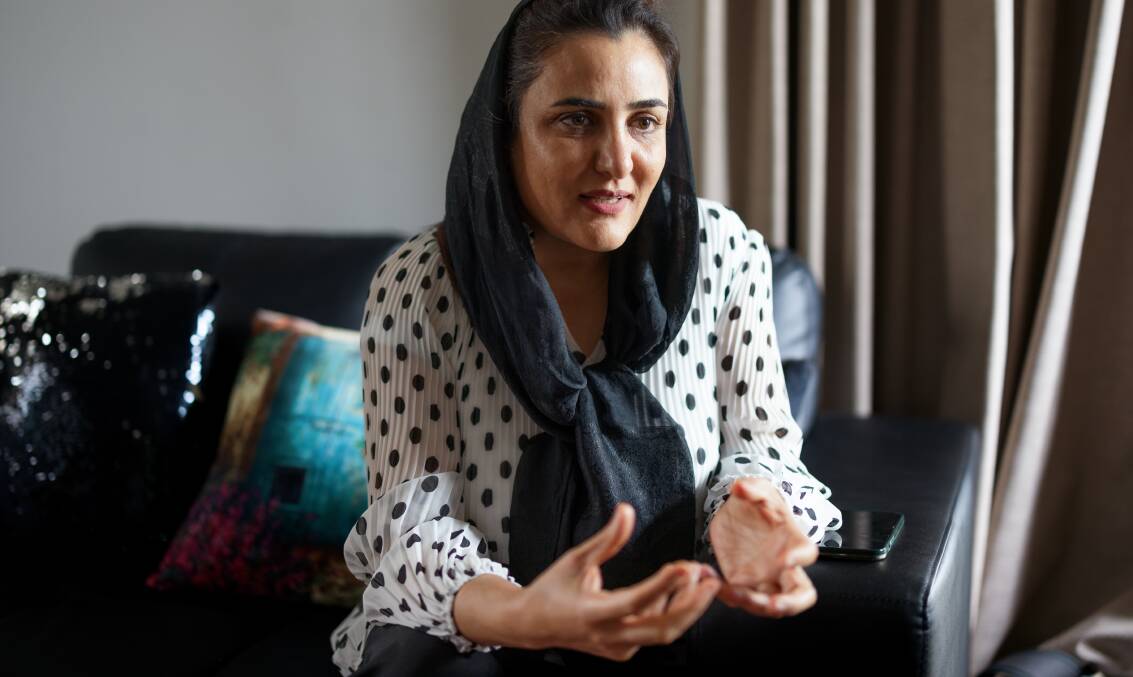
Language has shaped the life of Dr Nilofar Ibrahimi and her family - for generations they have fought for and died for their Pashtun dialect.
Now the former Afghanistan MP is dedicated to learning English from her new home in Canberra, after fleeing from her beloved country when the Taliban seized control.
Frustrated by the depth of her English vocabulary compared to her native tongue, Dr Nilofar is determined to share her story. To speak the truth about the plight of her people, sheltering in their homes, too afraid to leave and the bleak future now faced by Afghanistan's girls and women.
She told The Canberra Times stories of people selling female babies for $100 so they could afford food and of former soldiers constantly on the move as the Taliban searches for and kills those who fought against them.
"If they find a military uniform, and they find the person who owns it, then they'll shoot them down... it's very horrific," she said.
"You can't listen to music and you can't talk with friends who are in the streets, because there are always people monitoring you.
"It seems like there's some sort of peace, kind of, since there's [not as much] killing as of now, but it's not that they don't kill. It's that people are too scared to do anything that could get them killed.
"And [the Taliban] are just a bunch of vicious people who use fear to control people and they think that's the way to run their government."
Like many people across the embattled country, Dr Nilofar has faced more than her fair share of tragedy.
Her grandfather, a well-respected politician, and her father, Ibrahim Beg, were murdered during Hafizullah Amin's bloody regime in 1979.
The father and son were buried alive during President Amin's three-month reign where at least 2000 political prisoners were executed and another 30,000 imprisoned. The short period he was in power stands out in the region's long history of bloodshed.
Dr Nilofar says the pair were marched out into the desert and buried under a mountain of sand. The family have not been able to retrieve their bodies.
Her mother was only 18 years old when her husband died and was left to care for two baby girls who, by Afghan standards, were considered orphans.

Dr Nilofar was able to rise above adversity to become the first female doctor in her province, a renown gynecologist and was voted in as a member of the Afghanistan parliament in 2010.
Her opponent Bazmohammad Ahmadi - a mid-level commander under Ahmad Sha Massoud during the resistance against Soviet occupation - was regarded as a national hero.
Over six months Dr Nilofar harnessed the power of women in her province and spoke to every woman for three minutes each. When it came to the polls, many wives went against their husbands wishes and voted for the doctor.
"The important thing is that the Afghanistan woman is very strong. If they... [are] educated, they do everything, they can do everything, they are very empowered," she said.
Dr Nilofar was shocked by the result and vowed to do what she could to fight for women's rights.
During her time in government she was key in introducing a new law to stop violence against women, expanded the local hospital, built new bridges, sealed roads and set up safe accommodation for girls attending university.
But the progress she had forged would soon come crashing down when the Taliban seized control of the government on August 15, 2021.
Dr Nilofar made a narrow escape. She managed to flee Afghanistan the day before the lives of millions of people came under the control of an un-elected terrorist group.
"The government collapsed in just one day," she said.
The female MP caught a plane on August 14 and fled to Turkey where she would begin the "baddest time" of her life.

Dr Nilofar had previously sent her husband and five children to Australia in 2014 after after a neighbour's son, mistakenly identified as her child, was kidnapped.
Her family have lived in Canberra since then and now reside in Gungahlin.
However, after leaving Afghanistan, the mother did not want her young children to see her so distraught. What followed was a two month period of isolation from friends, family and her country.
Dr Nilofar stayed in Turkey for several months before reuniting with her family and moving to Canberra in November 2021.
"She felt like she abandoned [her people] and just flew and then because of that, psychologically, it affected her a lot. And she was not in the best place being there by herself, isolated for two months," Dr Nilofar's daughter, currently in her final year of high school in Canberra, translated.
"She's not just someone who lost their country but also a politician who worked for those people.
"She feels bad for everyone in Afghanistan but especially women who are told to stay at home and they can't leave, and also the new generation of girls my age, who are basically starting their own lives and education and trying to find their own path and future which they can't have anymore."
By November Dr Nilofar was finally well enough to reunite with her family. After a heartfelt and emotional reunion and a period of adjustment to Australian life, she has directed all her energy into the Zam Zam Foundation. Dr Nilofar founded the charity while still in Afghanistan to help girls access education.
The dedicated woman has been in Canberra over four months and credits the kindness of the community in helping her rediscover her verve for life and resolve to battle injustice.
"She's just now trying to help her people... what's keeping her going is helping the people who've helped her get to where she is now. And all the people that are in a very tough place," her daughter said.
"She's been there, she knows what it's like so she wants to help them get through all of this as well."
"The news cycle moves from one crisis to another"
A growing number of people swept up in conflicts are seeking refuge in Australia, many often carry with them the impacts of torture and trauma as they leave their country behind.
Refugee Council Australia president Jasmina Bajraktarevic said challenges faced by refugees when they arrive from overseas were "a complex interaction of factors".
"People who arrive as refugees come with the impacts of torture and trauma, and those would include psychological impacts, such as post traumatic stress disorder, depression, or anxiety, and also physical impacts of exposure to trauma, that changes the brain, and then that impacts on how how people engage with the environment around them," she said.
Ms Bajraktarevic said when the media cycle moves from one tragedy to another, people often felt forgotten by the rest of the world.
"Every time the news cycle moves to the next crisis in the world, people from the previous crisis feel abandoned," she said.
This comes as 2021 marked Australia's smallest refugee and humanitarian program in 45 years.
Data from the Department of Home Affairs reveals that only 5947 refugees were admitted into the country after the original annual cap of 13,750 places was significantly hindered by COVID-19. The majority of refugees accepted for 2021 came from from Iraq, Myanmar and Afghanistan.
Meanwhile, millions of Ukrainians have fled or are displaced by the Russian invasion. So far the federal government has welcomed more than 750 Ukrainian refugees into the country under uncapped temporary three year humanitarian visas.
The Refugee Council is pushing for the government to allow a one-off intake of 20,000 for people from Afghanistan over two years, and an overall increase to the refugee and humanitarian program to 20,000 per annum.







